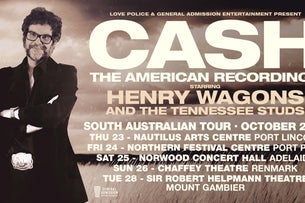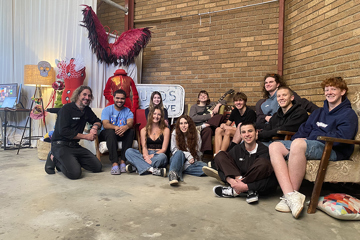How Working In Nashville Is Like Being On Grand Designs
"Me trying to be ultra-confessional also saw me being ultra-playful and remembering some really stupid and crazy moments."

After 15 successful years and seven studio albums together, it was time for the members of Wagons to explore their own personal projects. "We all made a mutual decision to take a little break," says Henry Wagons [Henry Kripps]. "We just watched a few too many movies on transcontinental flights on a seven-inch screen and it was just starting to hypnotise us and indoctrinate us in the wrong way."
"Less booze, less hair, less BO, less history and in some degree less, you know, camaraderie."
Faced with some time off from the band, Kripps says, "You might guess this about me, I'm not very good at letting the spotlight dim for very long. Music is a compulsion for me and I had this opportunity to go and record in Nashville."
Don't miss a beat with our FREE daily newsletter
It's a place Wagons had developed a strong connection with, they were released on the Thirty Tigers label based there and had toured a lot through Tennessee. The way Kripps tells it, "We went to enough bars, saw enough music, played enough music in that city to have lots and lots of friends over there." As a result, he says, he knew pretty much exactly who he wanted to work with on his album. "There's this sort of automatic thing as a frontman, in executing your craft you can't help but think who would be great behind me, helping me materialise my ideas?"
Behind the scenes, there was "chugging away a bit of an offer for a new solo record deal" and he already had "a sort of little fantasy football team of a band". Sooner than he had expected, says Kripps, "I was on the Webjet website."
"Being in bands in Melbourne, music is made amongst friends and it sort of comes out by osmosis as a result of friendships and alcohol."
Recording in Nashville without the band was a very different process to what he'd been used to. "I'm kind of putting my boots in some pretty heavy steps and heading over to the American south and playing with players over there and having them flesh out my crazy ideas. It's the stuff of dreams for songwriters, especially within my kind of scene." He summarises: "Less booze, less hair, less BO, less history and in some degree less, you know, camaraderie."
It was far removed from the organic, garage musical style Kripps was used to. "My kind of heritage upbringing in terms of being in bands in Melbourne, music is made amongst friends and it sort of comes out by osmosis as a result of friendships and alcohol and big nights and then music is almost a side effect of the good time you're having. And art flows that way, and it's a very natural, incredible."
He compares working in Nashville to being like being on an episode of Grand Designs. "Instead of it being this organic, long, beautiful, drawn-out history-invoking process, it's like a whole bunch of experts sit around a table and think about how can we make this amazing. Right here, right now, between us, let's do this. Let's make the most incredible art we can because we're all fucking good." He loves both approaches, "I love making music with my band and I love being on Grand Designs, and being in Nashville was incredibly exciting and different and stretched all sorts of different muscles for me."
The result — After What I Did Last Night — became a deeply autobiographical record. "I wanted to pay appropriate tribute to the concept of doing a solo album. It's like, if I'm going to do a solo album and it's just me, I want all these songs to be about me, and track my history. And I wanted to make the most personal album I could," says Kripps.
The album is deeply deep south, drawing on his favourite influences from Neil Young and Bob Dylan to Johnny Cash. "When people usually think of confessional songwriting," muses Kripps, "People tend to think of it in general as being a psychiatrist's couch — you're playing a song on the end of a pier with an acoustic guitar with tears falling in the water, you've got this emo male pain thing happening. But I found that when I was trying to be confessional — I don't know if it's just who I am — when I was telling my truths about my misspent youth or my time at uni or touring the States or whatever, stupid stuff would come out as well. The stuff that compels me to write songs, sure, is those universal emotions of pain and love lost and falling in love. But also, a song gets propelled to completion just as likely because it makes me laugh or smirk. So in this weird way, me trying to be ultra-confessional also saw me being ultra-playful and remembering some really stupid and crazy moments."








